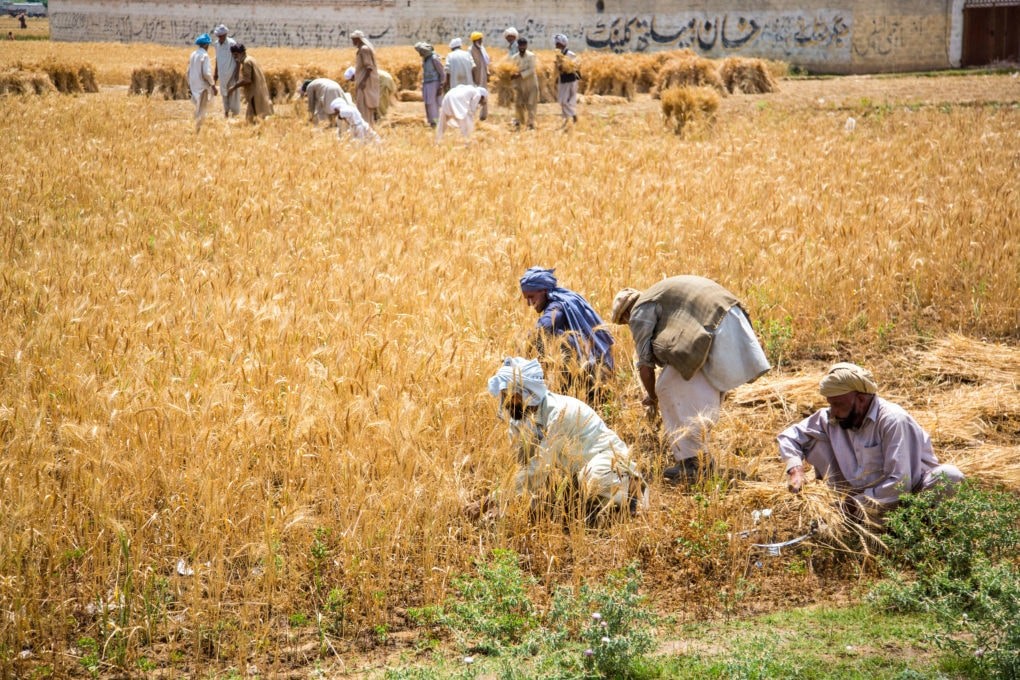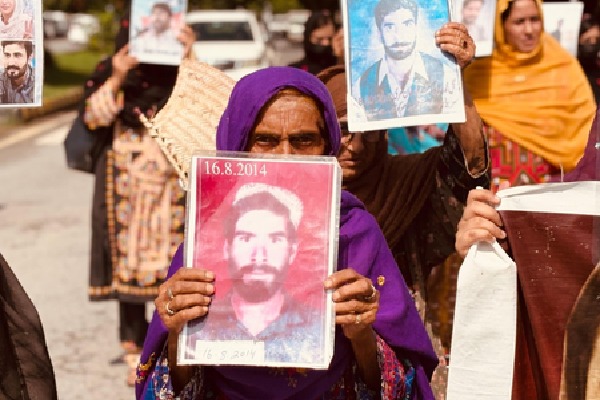
CP7E6K Harvesting grain in Punjab Province, Pakistan
Agriculture that supports livelihoods of a majority population in Pakistan has been under tremendous pressure due to climate change socks. Yet, there seems to be no concrete action on the part of Islamabad government.
The rising temperature, prolonged droughts, intense rains, heavy floodings has led to decrease in overall production and productivity of major crops such as maize, wheat, cotton and rice. The ill-effects of climate change are threatening the food security and livelihoods in Pakistan.
Pakistan features among the top 10 climate-vulnerable countries as it witnessed intense extreme weather events that are going to have strong impact in long term. Over 500 people died every year due to climate change during 2001-2019 while the average annual losses turned out to be USD 3.2 billion. Pakistan has not yet recovered from the negative impacts of the past.
Cultivators living in mountainous region and along the Indus River will be badly hit. Agricultural production is likely to decrease significantly as the annual temperature is expected to be increase by up to 2.8 degrees Celcius and total precipitation by up to 7 percent by 2050, as per the Climate Smart Agriculture (CSA), a World Bank led Initiative.
“Changes in monsoons and increased temperatures are likely to bring considerable challenges to agriculture, particularly in northern Pakistan, where vulnerability to climate change is already high. Increases in temperature will likely speed up crop growth cycles and shorten the time between sowing and harvesting, affecting crop yields,” as per the CSA.
Ijaz Ahmed Rao, a farmer from Bahawalnagar, has been in a distress due to heatwaves that have increased his spendings on agriculture inputs such as fertilisers and pesticides. “Torrential rains will increase the risk of disease and pest attack, causing production losses. It is as bad, if not worse, as extreme dry and hot weather,” he said.
Dr Sobia Rose, research fellow at Islamabad-based Pakistan Institute of Development Economics, painted bleak picture for Pakistan’s agriculture thanks to low productivity, technological lag, and vulnerability to climate change besides water scarcity. “The efforts exerted for adaptation and to mitigate the impact of climate change are not sufficient,” she said.
Livestock that plays important part in Pakistan’s food and nutritional security is also vulnerable to climate shocks. Since beginning of year 2024, over 15,000 cattle have died in Karachi alone. Farmers and experts have blamed government for its apathy and negligence. Shakir Umar Gujjar, president of the Cattle and Dairy Farmers Association, said farmers have been left to fend for themselves by the government.
Many researchers and activists have slammed the government for its inaction to address the impending survival crisis despite occurrence of mega climate-disasters in recent years. “These climate disasters have failed to move the government to pore over the plethora of climate policy documents it has crafted over the years and find solutions from it,” said environmental journalist Zofeen T. Ebrahim.
One Pakistan lawyer even charged the Islamabad government with violating his fundamental right as its inaction in meeting climate change adaptation targets threatened food and water security. Lack of preparedness and policy paralysis have affected Pakistan’s readiness to protect agriculture from climate change shocks. Sobia Kapadia, a humanitarian aid practitioner, said the “weak governance” led to “fire-fighting and ad-hoc measures” whenever climate disasters occur.
While the government in Islamabad appears to have not yet woken up to the reality, foreign dignitaries living in the country have sounded alarm. Australian High Commissioner to Pakistan Neil Hawkins who visited rural areas of Pakistan expressed concerns over the intense water scarcity and climate change’s impact on food and nutritional security, especially of children.
“By 2047, Pakistan will likely have twice the population and half the water it now has. Four out of every ten Pakistani households rely on agriculture for their living. Their food security is already suffering. Women and children are the first to be affected. Almost one fifth of children under five suffer from acute malnutrition,” he said.






